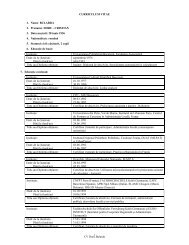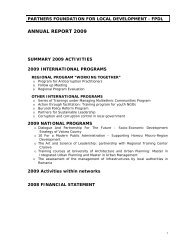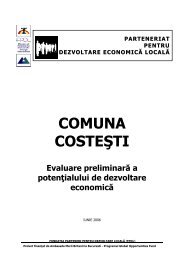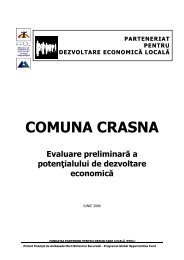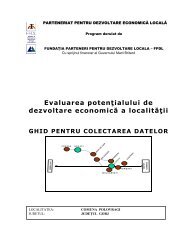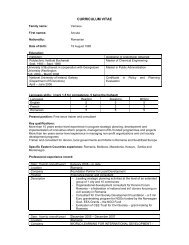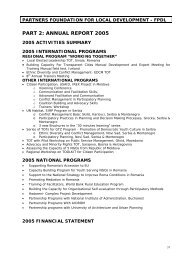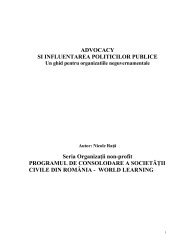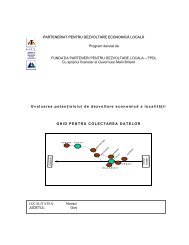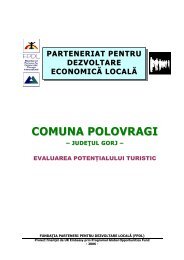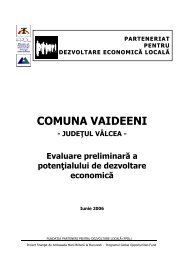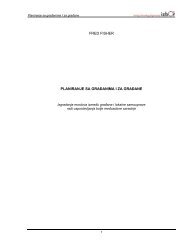Organizational Development: A Manual for Managers and ... - FPDL
Organizational Development: A Manual for Managers and ... - FPDL
Organizational Development: A Manual for Managers and ... - FPDL
You also want an ePaper? Increase the reach of your titles
YUMPU automatically turns print PDFs into web optimized ePapers that Google loves.
Internal processes, sometimes, are more difficult to check, because they are usually understood as<br />
a daily routine <strong>and</strong> not as special procedures. Internal organisational procedures may include:<br />
h<strong>and</strong>ling of documents, h<strong>and</strong>ling of complaints, public procurement, training, etc.. Deficiencies in<br />
the internal procedures sometimes may be the core reasons <strong>for</strong> failure to provide services <strong>for</strong><br />
external customers; there<strong>for</strong>e their examination may be important.<br />
What needs to be audited<br />
During the audit of organisational procedures the audit team should examine the following issues:<br />
1. What services does each subdivision provide?<br />
2. What are the customers (internal <strong>and</strong> external) of every service? Are they defined?<br />
3. How <strong>and</strong> where are the processes defined? Why is this particular order chosen?<br />
4. Are the responsibilities <strong>and</strong> authority defined in procedures?<br />
5. Are there undefined areas in procedures, where decisions are taken arbitrarily, on case to case<br />
basis?<br />
6. Flow of the procedure – description, why is this particular order chosen?<br />
7. Are the documented procedures implemented exactly how the described, if<br />
not - then why?<br />
8. How are the links with other procedures established? Are there overlaps with other procedures?<br />
Are there any duplicated activities (the same activities per<strong>for</strong>med by two or more subdivisions,<br />
i.e. data collecting activities)? Etc.<br />
The audit team must be aware that flowcharting of complicated procedures may take some time<br />
<strong>and</strong> not always it is possible to make them “on the fly” by interviewing one person. There<strong>for</strong>e it<br />
could be necessary to make interviews during two visits, when the first visit is aimed at defining<br />
responsibilities, processes, services etc., <strong>and</strong> the second visit is aimed at reviewing the collected<br />
in<strong>for</strong>mation <strong>and</strong> description of the main procedures. During those visits it could be necessary to<br />
review the audit objectives <strong>and</strong> previously identified main areas <strong>for</strong> analysis.<br />
B) PROCEDURE IS WRITTEN.<br />
<strong>Organizational</strong> procedures may be already documented using various documentation techniques,<br />
<strong>and</strong> may be present in various internal documents (regalement, regulations, service st<strong>and</strong>ards,<br />
written procedures etc.). Quite often parts of one procedure may be defined in several documents.<br />
In case when procedure is written (documented), during the interviews the auditor should examine<br />
if the procedure is implemented, <strong>and</strong> clarify the points, which might not be described in the written<br />
procedure (such as criteria <strong>for</strong> decision).<br />
Then the auditor decides if there is a necessity to draw a flowchart, collecting additional<br />
in<strong>for</strong>mation <strong>and</strong> indicating deficiencies in the procedure as described above.<br />
When the auditor finds that the written procedure is not implemented or only partially implemented,<br />
he should find the reasons why, <strong>and</strong> who made the decision not to follow the written procedure.<br />
The procedure might not be implemented, because:<br />
• It is outdated,<br />
• It is contradictory,<br />
• Related legal requirements have changed;<br />
• There are some other reasons.<br />
The auditor must be aware that managers usually tend to present the wished situation as actual<br />
<strong>and</strong> it is not easy to underst<strong>and</strong> it clearly from the interview. There<strong>for</strong>e from time to time it is a good<br />
idea to ask a question “Is it implemented/working or planned/sought?”<br />
186



